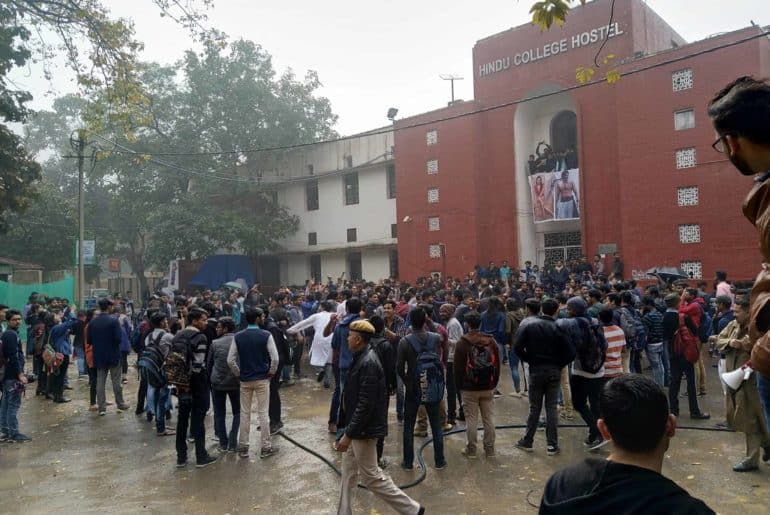After the controversy following the “V-Day Puja”, Women and Gender cells from across the University have risen to support the struggle of students at Hindu College against the sexist tradition, by observing a protest at the College on 17th February 2020.
On 17th February 2020, Hindu College observed a demonstration against the College’s annual ‘V-Day Puja’ , annually celebrated on the Valentine’s Day, and the unsuccessful executional ban over this year’s annual puja. Despite previous negotiations amongst the Student body and the Administration, deciding an unanimous ban over the event for this year, it was still observed by the Boys’ Hostel Union on 14th February 2020.
Students claim that ABVP’s men were allegedly involved amongst the mob that ignored the administration’s denial of permission and continued to observe the tradition. A demonstration was therefore observed against the incident at 1 pm outside the college. However, ABVP has denied all claims of involvement, and have called the rumours of their involvement as criminal defamation.
Ankitaa Biswas, President, ABVP Hindu College told DU Beat, “ABVP-Hindu College was not involved in any act of hooliganism that happened on 14 February,2020 during the V-tree function within the college premises. Neither ABVP, nor any ABVP activist partook in the impugned act of campus commotion. All allegations pertinent to ABVP’s involvement in a bevy of mischievous acts ranging from provocative poster-making to incendiary sloganeering are unsubstantiated and appear contrived to sully the organization’s good name and reputation. Such unfounded assertions constitute criminal defamation.”
She further added, “According to several eyewitnesses, the sequence of events on that fateful day stands in stark contrast to the ridiculous claims being made by ABVP’s ideological adversaries. Saboteurs belonging to SFI, AISA and Pinjratod trespassed into the Hindu College, misbehaved with the students, and made extensive efforts to vitiate the atmosphere of peace and harmony on the campus.”
The Administration of Hindu College has been in question regarding the ‘V-Day Puja’ for years, with people claiming the tradition to be discriminatory, patriarchal, Brahmanical, and a blatant display of toxic masculinity and sidebars for female dignity. After the condemnation of the tradition gaining momentum, the students were denied permission by the Administration to observe the Puja. Yet the puja was still observed on 14thFebruary, with no retaliation from the administration and allegations of ABVP hooligans’ involvement in the mob that disregarded the official orders.
“The misogynistic acts besides V-Tree and violence on women and protestors on Valentine’s Day inside the College premises. We condemn such misogynistic and violent acts, stand in solidarity with the victims and demand immediate disciplinary actions against the harassers and who violated the decision which was declared the Principal in the Students-Admin meeting. The incident that happened at Gargi College shook us all and compelled us to think are University Spaces really safe for women? Are University Spaces really inclusive? This sorts of mobs that often enter College and University spaces to wreak havoc that we also noticed in JNU. All of us have to fight against the mob constitutionally and peacefully,” All India Queer Association (AIQA) stated.
Various Women and Gender Cells from across the University have risen up to provide support and stand in solidarity with the women students of Hindu College, namely the Women Development Cell of Miranda House, Lady Sri Ram College, Sri Venkateswara College, as well as Gender Forum of Ramjas College, The Gender Studies Cell of St. Stephen’s College, IP Student’s Collective, and the Delhi School of Journalism.
Feature Image Credits: DU Beat Archives
Shreya Juyal














